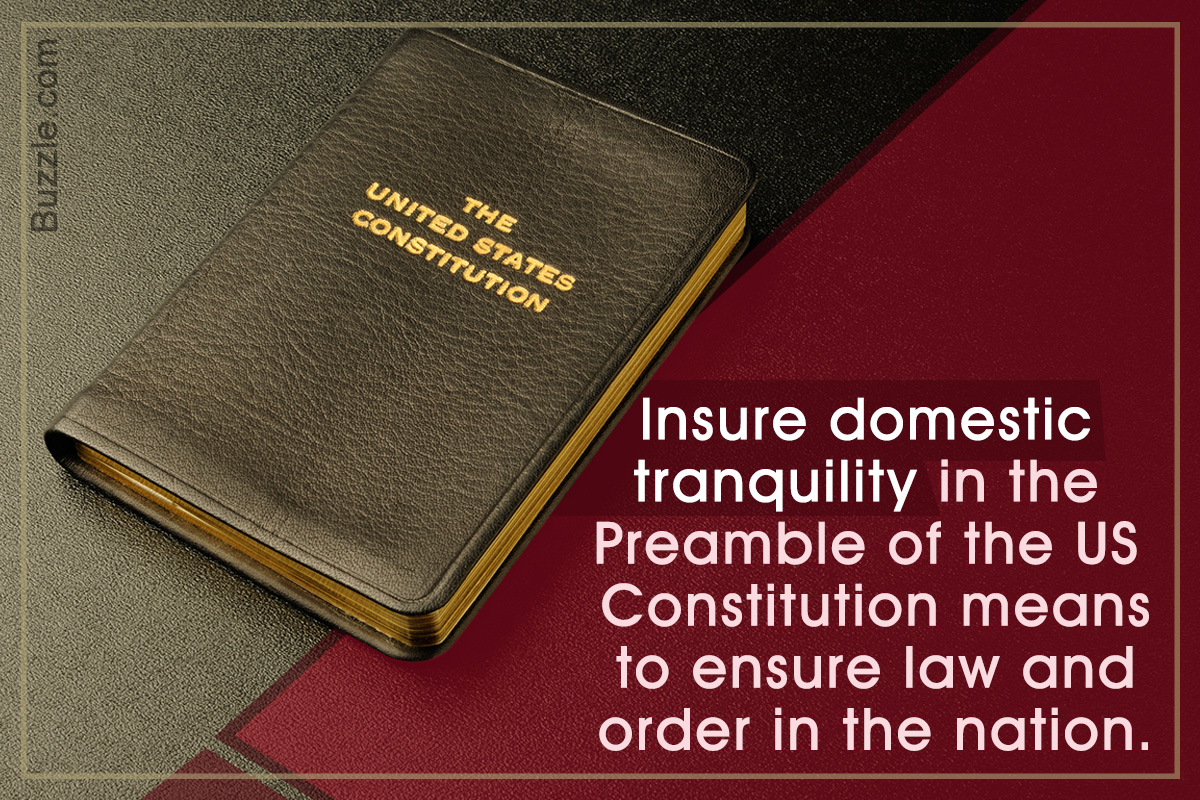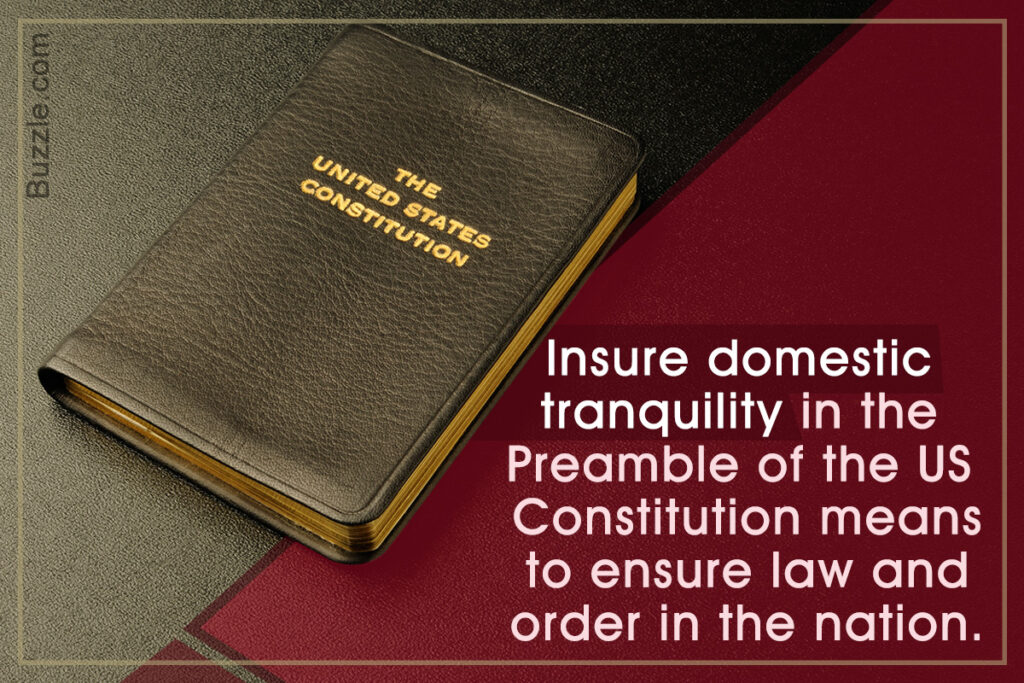Role of the Federal Government
The federal government plays a pivotal role in maintaining domestic tranquility within the United States. The Constitution empowers the federal government with specific powers that enable it to ensure the peace and security of the nation.
Powers and Limitations
The federal government’s powers in maintaining domestic tranquility stem from its authority to regulate interstate commerce, establish and maintain a national defense, and provide for the general welfare of the people. These powers allow the federal government to take actions such as regulating firearms, deploying the military to quell civil unrest, and providing financial assistance to states and localities in the aftermath of disasters.
However, the federal government’s powers in this regard are not unlimited. The Constitution also reserves certain powers to the states, including the power to enforce criminal laws and maintain public order. This division of authority between the federal and state governments ensures that the federal government does not overreach its authority and that the states retain a significant degree of autonomy in matters of domestic tranquility.
Balance of Authority
Maintaining domestic tranquility requires a delicate balance between federal and state authority. The federal government must have sufficient power to address threats to national security and to ensure the well-being of all citizens, while the states must retain the ability to respond to local needs and to protect the rights of their citizens.
This balance is often tested during times of crisis, such as natural disasters or civil unrest. In these situations, it is essential for the federal government and the states to work together to coordinate a response that is both effective and respectful of the constitutional division of authority.
Domestic Threats to Tranquility
Domestic tranquility can be disrupted by a range of threats, including terrorism, civil unrest, and natural disasters. Terrorism involves acts of violence or intimidation perpetrated by non-state actors to achieve political or ideological goals. Civil unrest encompasses protests, riots, and other forms of collective action that challenge the authority of the state. Natural disasters, such as hurricanes, earthquakes, and wildfires, can cause widespread destruction and disruption, threatening the well-being and safety of citizens.
Government Strategies for Addressing Domestic Threats
The federal government employs various strategies to address domestic threats. Law enforcement agencies, such as the Federal Bureau of Investigation (FBI) and the Department of Homeland Security (DHS), are responsible for investigating and preventing terrorist activities. The government also works to foster community resilience and prevent radicalization through programs that promote tolerance and understanding. In the event of civil unrest, law enforcement and the National Guard may be deployed to maintain order and protect public safety. For natural disasters, the Federal Emergency Management Agency (FEMA) coordinates disaster relief efforts and provides assistance to affected communities.
Challenges and Limitations in Countering Domestic Threats
Countering domestic threats poses significant challenges. Identifying and monitoring potential threats can be difficult, especially in the case of terrorism, where individuals or groups may operate in secrecy. Additionally, balancing security measures with civil liberties is a delicate task, as excessive surveillance or restrictions on free speech can undermine public trust and confidence. The government must also navigate the complexities of federalism, ensuring that states and local authorities have the resources and authority to address domestic threats effectively.
International Implications

Domestic tranquility has far-reaching international implications. A nation experiencing internal instability often faces challenges in maintaining positive foreign relations and safeguarding its national security.
Domestic unrest can erode trust among nations, making it difficult to form alliances and collaborate on global issues. When a country is preoccupied with internal conflicts, it may be less likely to engage in international diplomacy or provide support to other nations.
Impact on National Security
Domestic instability can weaken a nation’s defenses and make it more vulnerable to external threats. Internal divisions and conflicts can divert resources away from military preparedness and intelligence gathering, leaving the country susceptible to attacks or aggression.
Role of International Cooperation
Promoting global tranquility requires cooperation among nations. International organizations, such as the United Nations, play a vital role in mediating conflicts, providing humanitarian aid, and fostering dialogue between nations. By working together, countries can address common challenges and create a more stable and peaceful world.
Challenges and Opportunities
Ensuring domestic tranquility presents both challenges and opportunities for the government.
The evolving nature of threats and technological advancements pose significant challenges. Emerging threats such as cyberattacks, domestic terrorism, and climate change can destabilize society and erode tranquility. Advancements in technology, while offering opportunities for enhanced surveillance and communication, also raise concerns about privacy and potential misuse.
Despite these challenges, opportunities exist for the government to promote domestic tranquility. Innovative approaches such as community policing, conflict resolution programs, and public-private partnerships can strengthen social cohesion and reduce violence. Best practices in law enforcement, such as de-escalation techniques and community engagement, can also contribute to a more peaceful society.
Emerging Threats and Technological Advancements
Cyberattacks and domestic terrorism are growing threats to domestic tranquility. Cyberattacks can disrupt critical infrastructure, steal sensitive information, and spread misinformation. Domestic terrorism, often fueled by extremist ideologies, can lead to violence and fear.
Advancements in technology can also impact tranquility. Social media platforms can facilitate the spread of misinformation and hate speech, contributing to social divisions. Surveillance technologies, while enhancing security, raise concerns about privacy and potential misuse.
Innovative Approaches and Best Practices
Community policing emphasizes building relationships between law enforcement and communities. This approach fosters trust and cooperation, reducing crime and promoting a sense of safety. Conflict resolution programs provide mechanisms for resolving disputes peacefully, preventing escalation and fostering social harmony.
Public-private partnerships combine resources and expertise from government, businesses, and community organizations to address root causes of unrest, such as poverty, inequality, and lack of opportunity. Best practices in law enforcement, such as de-escalation techniques and community engagement, prioritize dialogue and non-violent approaches, reducing the likelihood of confrontations.






